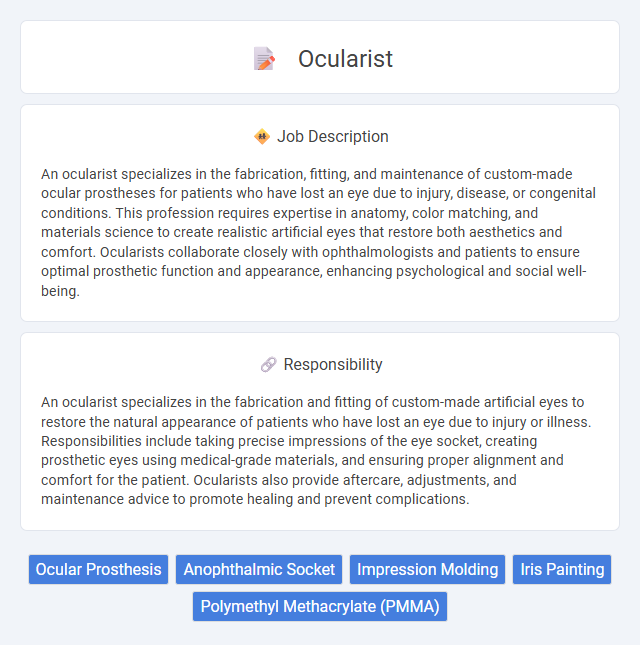
An ocularist specializes in the fabrication, fitting, and maintenance of custom-made ocular prostheses for patients who have lost an eye due to injury, disease, or congenital conditions. This profession requires expertise in anatomy, color matching, and materials science to create realistic artificial eyes that restore both aesthetics and comfort. Ocularists collaborate closely with ophthalmologists and patients to ensure optimal prosthetic function and appearance, enhancing psychological and social well-being.
Individuals with strong attention to detail and excellent manual dexterity are likely well-suited for a career as an ocularist, as the job requires creating and fitting custom prosthetic eyes. Those who enjoy working closely with patients experiencing eye loss or disfigurement may find this profession fulfilling but may face emotional challenges due to the nature of the condition. Candidates with patience, empathy, and a steady hand probably have a higher chance of success in this specialized medical field.
Qualification
An ocularist requires specialized training in fabricating and fitting custom ocular prostheses for patients who have lost an eye due to trauma or illness. Certification from recognized bodies such as the National Examining Board of Ocularists (NEBO) ensures proficiency in both artistic and medical aspects of prosthetic eye creation. Strong skills in anatomy, materials science, and patient care are essential for successful rehabilitation and comfort of the ocular prosthesis wearer.
Responsibility
An ocularist specializes in the fabrication and fitting of custom-made artificial eyes to restore the natural appearance of patients who have lost an eye due to injury or illness. Responsibilities include taking precise impressions of the eye socket, creating prosthetic eyes using medical-grade materials, and ensuring proper alignment and comfort for the patient. Ocularists also provide aftercare, adjustments, and maintenance advice to promote healing and prevent complications.
Benefit
Working as an ocularist probably offers the benefit of combining artistic skills with medical knowledge to create custom prosthetic eyes, which can greatly enhance patients' self-esteem and quality of life. This job likely provides a sense of fulfillment by helping individuals regain their confidence and normal appearance after eye loss or trauma. The specialized nature of the field may also lead to stable career opportunities and potential financial rewards.
Challenge
The role of an ocularist likely involves significant challenges related to creating custom prosthetic eyes that match a patient's natural appearance. Precision and artistic skill are probably essential to ensure comfort and realistic aesthetics, which can be particularly demanding. Meeting the emotional and psychological needs of patients adjusting to eye loss may also present a complex aspect of the job.
Career Advancement
An ocularist specializes in fitting and fabricating custom ocular prostheses, blending medical knowledge with artistic precision. Career advancement opportunities include becoming a senior ocularist, managing a clinic, or pursuing teaching roles in ocularistry programs. Expanding skills in digital imaging and 3D printing technologies can further enhance professional growth and marketability.
Key Terms
Ocular Prosthesis
Ocularists specialize in the fabrication and fitting of ocular prostheses, custom-made artificial eyes designed to restore the appearance of a natural eye after enucleation or trauma. They employ advanced techniques in molding, coloring, and polishing to ensure a realistic fit and aesthetic match to the patient's existing eye. Their expertise not only improves facial symmetry but also supports psychological rehabilitation for patients with eye loss.
Anophthalmic Socket
An ocularist specializes in creating and fitting custom artificial eyes for patients with an anophthalmic socket, restoring both appearance and functionality after eye loss. Expertise in sculpting ocular prostheses tailored to the unique contours of the anophthalmic socket ensures comfort and natural aesthetics. Skilled ocularists also provide ongoing care and adjustment services to maintain socket health and prosthetic alignment.
Impression Molding
Impression molding is a critical skill for ocularists, enabling precise customization of ocular prostheses by creating an accurate mold of the eye socket. This process involves using specialized materials such as alginate or silicone to capture fine anatomical details, ensuring a comfortable and natural fit. Mastery of impression molding directly impacts the prosthesis' functionality and aesthetic integration with surrounding tissues.
Iris Painting
An ocularist specializes in fabricating and fitting custom prosthetic eyes, with a key focus on iris painting to achieve lifelike appearance. Advanced iris painting techniques involve meticulously hand-painting the iris to match the color, pattern, and depth of the patient's natural eye, enhancing facial symmetry and confidence. Mastery in color blending and detailed brushwork is essential for realistic prostheses that improve aesthetic outcomes and psychological well-being.
Polymethyl Methacrylate (PMMA)
Ocularists specialize in creating custom artificial eyes using Polymethyl Methacrylate (PMMA), a durable and biocompatible acrylic material ideal for ocular prosthetics. PMMA's transparency and stability allow for precise fabrication of lifelike prosthetic eyes that restore appearance and improve comfort for patients with ocular loss. Mastery of PMMA handling and shaping techniques is essential for ocularists to deliver prosthetics that closely mimic natural eye anatomy and coloration.
 kuljobs.com
kuljobs.com